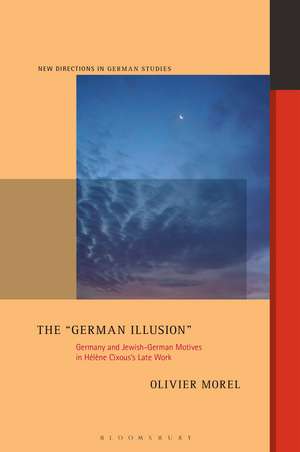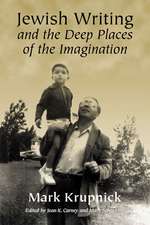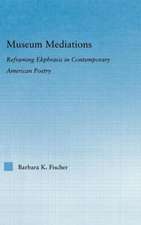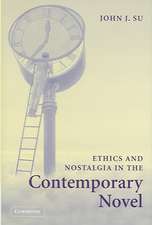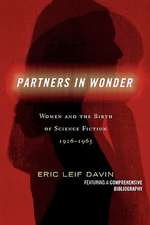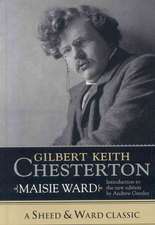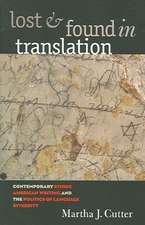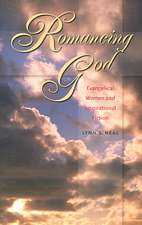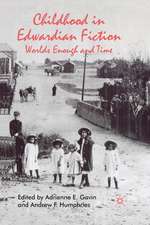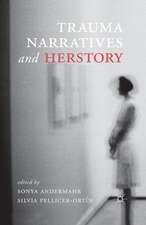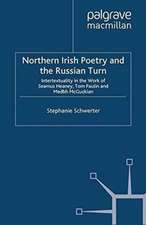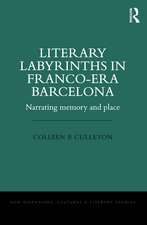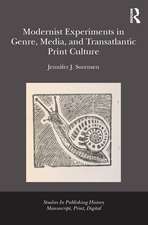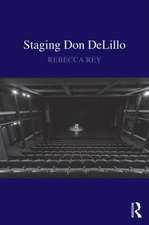The "German Illusion": Germany and Jewish-German Motifs in Hélène Cixous’s Late Work: New Directions in German Studies
Autor Professor or Dr. Olivier Morel Prof Imke Meyeren Limba Engleză Hardback – 13 dec 2023
Din seria New Directions in German Studies
- 14%
 Preț: 183.70 lei
Preț: 183.70 lei -
 Preț: 470.91 lei
Preț: 470.91 lei - 8%
 Preț: 145.46 lei
Preț: 145.46 lei - 11%
 Preț: 219.84 lei
Preț: 219.84 lei - 23%
 Preț: 190.50 lei
Preț: 190.50 lei -
 Preț: 169.04 lei
Preț: 169.04 lei -
 Preț: 217.09 lei
Preț: 217.09 lei - 7%
 Preț: 134.49 lei
Preț: 134.49 lei - 14%
 Preț: 183.24 lei
Preț: 183.24 lei -
 Preț: 217.62 lei
Preț: 217.62 lei - 21%
 Preț: 214.78 lei
Preț: 214.78 lei - 30%
 Preț: 718.85 lei
Preț: 718.85 lei - 22%
 Preț: 237.93 lei
Preț: 237.93 lei - 22%
 Preț: 225.77 lei
Preț: 225.77 lei - 22%
 Preț: 256.77 lei
Preț: 256.77 lei - 22%
 Preț: 225.41 lei
Preț: 225.41 lei - 23%
 Preț: 222.46 lei
Preț: 222.46 lei - 30%
 Preț: 714.12 lei
Preț: 714.12 lei - 30%
 Preț: 568.22 lei
Preț: 568.22 lei - 21%
 Preț: 218.36 lei
Preț: 218.36 lei - 11%
 Preț: 218.47 lei
Preț: 218.47 lei - 13%
 Preț: 186.35 lei
Preț: 186.35 lei - 30%
 Preț: 569.94 lei
Preț: 569.94 lei - 21%
 Preț: 218.83 lei
Preț: 218.83 lei - 22%
 Preț: 256.20 lei
Preț: 256.20 lei - 14%
 Preț: 190.06 lei
Preț: 190.06 lei - 23%
 Preț: 197.14 lei
Preț: 197.14 lei - 13%
 Preț: 255.11 lei
Preț: 255.11 lei - 22%
 Preț: 226.79 lei
Preț: 226.79 lei - 30%
 Preț: 568.14 lei
Preț: 568.14 lei - 14%
 Preț: 191.85 lei
Preț: 191.85 lei -
 Preț: 183.24 lei
Preț: 183.24 lei -
 Preț: 231.81 lei
Preț: 231.81 lei - 22%
 Preț: 230.24 lei
Preț: 230.24 lei
Preț: 539.25 lei
Preț vechi: 773.38 lei
-30% Nou
Puncte Express: 809
Preț estimativ în valută:
103.22€ • 112.16$ • 86.76£
103.22€ • 112.16$ • 86.76£
Carte tipărită la comandă
Livrare economică 21 aprilie-05 mai
Preluare comenzi: 021 569.72.76
Specificații
ISBN-13: 9798765107379
Pagini: 288
Ilustrații: 33 b&w illustrations
Dimensiuni: 140 x 216 mm
Greutate: 0.48 kg
Editura: Bloomsbury Publishing
Colecția Bloomsbury Academic
Seria New Directions in German Studies
Locul publicării:New York, United States
Pagini: 288
Ilustrații: 33 b&w illustrations
Dimensiuni: 140 x 216 mm
Greutate: 0.48 kg
Editura: Bloomsbury Publishing
Colecția Bloomsbury Academic
Seria New Directions in German Studies
Locul publicării:New York, United States
Caracteristici
Offers an introduction to Cixous through her historical, cultural, "German" family background that has not been researched extensively
Notă biografică
Olivier Morel is Associate Professor in the Department of Film, Television, and Theatre at the University of Notre Dame, USA. He is also a filmmaker, with cinematic work receiving prizes in international film festivals, and author of three books including Berlin légendes ou la mémoire des décombres (2013) and a graphic novel, Walking Wounded: Uncut stories from Iraq (2015).
Cuprins
Introduction: "An Originary Exile" I. I call Germany: The Landline (1916-2016)1. The first telephone2. The dream call3. The last phone callII. "Os, na, brück": The Capital of Memory (1933-1935)1. Ruins and remembrance: from "Os, na, brück" to "Rom'"2. Osnabrück the instrument of Peace: "recorder," recorder3. Remembrer-remember: a detour to Montaigne's Tower. and its ruins(image)4. "Je suis, nous sommes le 23 octobre 1935". The October 23, 1935 picture 5. N'ai-je pas vu (Have I not seen.) la neige pas vue (.the snow not seen)?III. An Originary Move: The Move of the Origin (1938)1. Omi was in Osnabrück. 2. "Bericht" 3. "Etwas"4. Epilog IV. Zugehör: The Jewish-German psyche1. "Envoûté," delirium2. "We" 3. Epilog: ZugehörConclusion: FrauenprotestAfterword: A filmed-interrupted interview with Hélène CixousAcknowledgementsBibliographyIndex
Recenzii
The Algerian-born French writer and philosopher Hélène Cixous, whose mother was German, has, since the mid-1990s, repeatedly addressed the fate of her German-Jewish family in Nazi Germany. In recent years, she has created in several of her works a harrowing memorial to the German-Jewish world. Olivier Morel's remarkable book is now the first study of this important subject. In a reading of great intensity, he succeeds in deciphering the dense web of motifs that structures the cycle and at the same time links it closely to the author's overall ouvre. Convincingly, he argues that the cycle culminates in the concept of the 'German illusion,' which Cixous uses to describe the Jewish population's mistaken belief that they had found a home in Germany.
What Olivier Morel's fascinating book reveals is not just a missing piece of Hélène Cixous's biography but a nuanced reconstruction, at once historical and poetic, of the 'German malady' (that will never be fully worked through), and an intersectional postcolonial story that fits no readily available historical category. A story of exile within exile, this book offers a searing investigation of 'GermanAlgeria' (or 'Osnabrück-Oran') in the crucible of irrecuperable origins. It describes a singular Franco-Algerian, German-Jewish case of diaspora, self-dispossession, and untranslatability but its audience is anyone and everyone who can identify with the experience of surviving within outsider lifeworlds.
What Olivier Morel's fascinating book reveals is not just a missing piece of Hélène Cixous's biography but a nuanced reconstruction, at once historical and poetic, of the 'German malady' (that will never be fully worked through), and an intersectional postcolonial story that fits no readily available historical category. A story of exile within exile, this book offers a searing investigation of 'GermanAlgeria' (or 'Osnabrück-Oran') in the crucible of irrecuperable origins. It describes a singular Franco-Algerian, German-Jewish case of diaspora, self-dispossession, and untranslatability but its audience is anyone and everyone who can identify with the experience of surviving within outsider lifeworlds.
